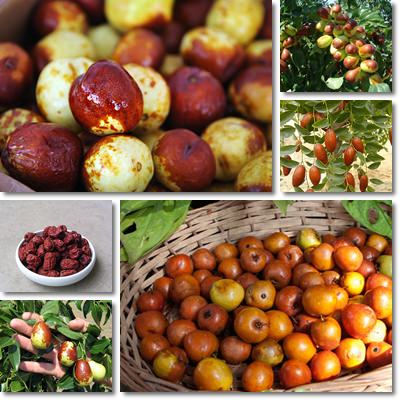Jujuba or jujube (Ziziphus jujuba) is the savory fruit of the tree with the same name. Jujubes are known to have quite potent stress-relieving properties and were shown to enhance memory, attention and boost motivation. With a good vitamin and mineral content, jujubes are a far more nutritious fruit than our ever-present supermarket apple, with impressive antioxidant, antibacterial and antiviral effects.
The fruit has been traditionally used to boost immunity and increase resilience to infection and disease. Other uses of the fruit indicate benefits for cardiovascular and digestive system health.
Jujube cultivars include: Li, Lang, Chico, Jin, So, Shui Men, Shanxi Li, Polenski, Sherwood, Sugar Cane, Silverhill, Topeka, etc. Jujube trees are quite resilient, withstanding high summer temperature as well as below freezing point temperatures (of about -30 degrees Celsius). They aren’t very particular about soil either. Plenty of sunlight and regular watering are all the requirements to be fulfilled for quality fruit. That being said, let’s talk about looks.

What does jujube look like?
The fruit are small, plump and oval and may range in size from that of cherry to that of plum. Unripe fruit have a smooth, crisp, light green skin, sweet white flesh and taste like green apples. As they mature, the skin turns to golden yellow, orange and finally dark red and purplish, very similar in appearance to cherry plums. Jujube fruit tend to wrinkle when fully ripe and, at this stage, look a lot like dates, hence their other names.
The fruit of the jujube tree is also called jujuba, Indian date, Chinese date, Korean date or simply red date, all names having to do with either the distribution area of the tree or the appearance of the fruit.
What do jujube fruit taste like?
Ripe jujube fruit taste a lot like dried apples and, overall, they are mild-flavored but quite savory. They boast a crunchy texture reminiscent of that of dates. Dried jujubes are pleasant-tasting as well. Last but not least, each fruit has a single inedible stone-seed in the center. The seed is better off planted somewhere rather than eaten.

What are jujubes good for?
See my list of the top 5 nutrition facts and health benefits of jujube fruit:
Improve memory, attention and concentration
According to research, jujube has nootropic properties, making it a food that improves memory, attention, concentration and other cognitive functions. Eating it on a regular basis may help support brain activity as well as protect nerves from free radical damage in the form of oxidative stress.
Excellent antibacterial and antiviral properties
Being a great source of vitamin C, jujubes boast antibacterial and antiviral properties. A high intake of vitamin C not only reduces the frequency, but also the duration and severity of colds and flu, and reduces inflammation levels in the body, contributing to overall better health.
Offer antioxidant protection
Unripe jujube fruit (a.k.a. green jujube) are richest in antioxidants, notably polyphenols such as gallic acid, cinnamic acid and ascorbic acid. Antioxidants not only help prevent free radical damage, but also help reduce the harmful effects of an existent damage buildup such as inflammation. As you may already know, high inflammation levels have been found to precede the development of chronic disease (diabetes, cardiovascular disease, dementia, cancer and so on).
Benefits for reducing stress
Traditional medical practices recommend eating jujube fruit or drinking jujube tea as a natural method of relieving stress and restoring vitality. The fresh jujube juice in particular is full of essential vitamins and minerals with tonic, restorative properties. With around 79 kcal/100 g of fruit, jujube is also safe to eat if wish to maintain a steady weight.
Natural remedy for sore throat
Being mucilaginous in texture, jujube fruit help calm irritation and soothe sore throat discomfort. In many countries, pharmacies offer special decoctions made from jujube fruit to help treat sore throat and calm cough.
Other benefits and uses of jujube
Traditional medical practices recommend jujube fruit for boosting immunity, treating chronic constipation, lowering high blood pressure and as a natural contraception method for pregnancy prevention. While couples should definitely not rely on jujube for contraception, there may be some truth to other claims regarding their health benefits. For instance, the fruit contains good amounts of potassium, a mineral with excellent blood-pressure lowering properties.
Also, like all fruits and vegetables, jujube too contains dietary fiber which regulates transit and promotes easy and regular bowel movements, helping relieve constipation. If you are lucky enough to have your own jujube tree, I wholeheartedly recommend that you indulge in its fruit every chance you get. It doesn’t get more natural or healthier than home-grown.
